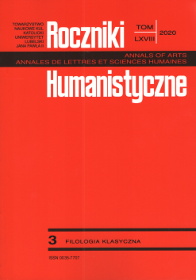Xenophont In Pseudo-Xenophont’s Letters and in Fictional Letters of Socrates and Socratics
Abstract
The aim of the analysis of the apocryphal correspondence of Pseudo-Xenophon, which tradition has given us with two independent paths—7 excerpts preserved in the Anthology by Stobaeus and 6 entire letters included in the Socratis et Socraticorum epistole (ed. R. Hercher)—is an attempt to delineate on their basis, a portrait of Xenophon, commonly accepted in the time of the Roman Empire. Pseudo-Xenophon letters clearly define the creator of Anabasis as the philosopher of Socratic, basically keeping silent about his historical work. They give us testimony to his thought, deeply rooted in Socratic ethics, focused on kalokagathia. Continuous pursuit of virtue through consistent improvement not only in pure ethics, but also in specific skills that are supposed to bring benefits, pointed to the key importance of paideia in Xenophont’s work as a pupil of Socrates. In these letters, the reference points are mostly ἐγκράτεια, καρτερία, ἀνδρεία, εὐσέβεια, φιλανθρωπία and finally σωφροσύνη, i.e. the virtues that form the core of Socratic ethics.
References
Borowska, Małgorzata. ΟΙΚΕΙΑ ΠΡΑΓΜΑΤΑ. Z dziejów dramatis personae rodzinnej komedii greckiej następców Arystofanesa. Warszawa: Wydawnictwo Uniwersytetu Warszawskiego, 1995.
Breitenbach, Hans Rudolf. „Xenophon von Athen”. W Realencyclopädie der Classischen Altertumswissenschaft [RE] IX A 2. Stuttgart: Alfred Druckenmüller Verlag, 1966.
Buzzeti, Eric. Xenophon the Socratic Prince. The Argument of “Anabasis of Cyrus”. New York, NY: Palgrave Macmillan, 2014.
Dorion, Louis-André. „Xenophon’s Socrates”. W A Companion to Socrates, edited by Sara Ahbel-Rappe, Rachana Kamtekar, 93-109. Malden–Oxford–Carlton: Blackwell Publishing, 2006.
Głombiowski, Krzysztof. Ksenofont. Żołnierz i pisarz. Wrocław–Warszawa–Kraków: Zakład Narodowy im. Ossolińskich, 1993.
Głombiowski, Krzysztof. „‘Anabasis’ V 3 – próba interpretacji”. Meander 45, nr 4-6(1990): 185-195.
Holzberg, Niklas. „Der griechische Briefroman. Versuch einer Gattungstypologie”. W Der griechische Briefroman. Gattungstypologie und Textanalyse, herausgegeben von. Niklas Holzberg, 1-52. Tübingen: Gunter Narr Verlag, 1994.
Köhler, Liselotte. Die Briefe des Sokrates und der Sokratiker, „Philologus Supplementband” 20. Heft 2. Leipzig: Dieterich’sche Verlagsbuchhandlung, 1928.
Morrison, Andrew D. „Authorship and authority in Greek fictional letters”. W The Author’s Voice in Classical and Late Antiquity, edited by Anna Marmodoro & Jonathan Hill, 287-312. Oxford: Oxford University Press, 2013.
Muir, John. Life and Letters in the Ancient Greek World. London–New York: Routledge, 2009.
Mueller-Goldingen, Christian. Xenophon. Philosophie und Geschichte. Darmstadt: Wissenschaftliche Buchgesellschaft, 2007.
Münscher, Karl. Xenophon in der griechisch-römischen Literatur, „Philologus Supplementband” 13. Heft 2. Leipzig: Dieterich’sche Verlagsbuchhandlung, 1920.
Reale, Giovanni. Historia filozofii starożytnej, t. I: Od początków do Sokratesa. Przełożył Edward Iwo Zieliński. Lublin: Wydawnictwo KUL, 1993.
Roscala, Fabio. „‘Kalokagathia e kaloi kagathoi’ in Senofonte”. W Xenophon and his World: Papers from a Conference held in Liverpool on July 1999, edited by Christopher Tuplin, 115-123. Stuttgart: Franz Steiner Verlag, 2004.
Rosenmeyer, Patricia A. Ancient Epistolary Fictions. The Letter in Greek Literature. Cambridge: Cambridge University Press, 2001.
Schleiermacher, Friedrich. „Ueber der Werth des Sokrates als Philosophen”. W Friedrich Schleiermacher’s sämmliche Werke, Zur Philosophie, Abt. 3, Dr. Friedrich Schleiermacher’s philosophische und vermischte Schriften, Bd. 2. Berlin: G. Reimer, 1838.
Sykutris, Johannes. Die Briefe des Sokrates und der Sokratiker. Paderborn: Verlag Ferdinand Schöningh, 1933.
Turasiewicz, Romuald. Studia nad pojęciem «kalos kagathos». Warszawa–Kraków: Państwowe Wydawnictwa Naukowe, 1980.
Copyright (c) 2020 Roczniki Humanistyczne

This work is licensed under a Creative Commons Attribution-NonCommercial-NoDerivatives 4.0 International License.





